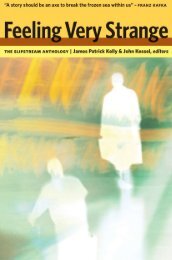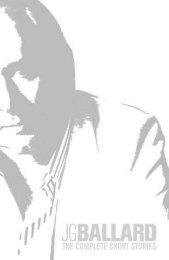The Curse of the Wer.. - Site de Thomas - Free
The Curse of the Wer.. - Site de Thomas - Free
The Curse of the Wer.. - Site de Thomas - Free
You also want an ePaper? Increase the reach of your titles
YUMPU automatically turns print PDFs into web optimized ePapers that Google loves.
66 THE CURSE OF THE WEREWOLF<br />
Constructions <strong>of</strong> <strong>the</strong> human mind as a conscious–unconscious dualism<br />
drew upon <strong>the</strong> familiar culture–nature, human–beast, civilized–<br />
primitive dichotomies un<strong>de</strong>rpinning nineteenth-century thought.<br />
<strong>The</strong> unconscious part <strong>of</strong> <strong>the</strong> mind was regularly associated with <strong>the</strong><br />
bestial, instinctive life <strong>of</strong> <strong>the</strong> natural, material world as opposed to<br />
<strong>the</strong> rational, cultured world <strong>of</strong> <strong>the</strong> conscious mind. In this sense, <strong>the</strong><br />
unconscious became strongly linked with a notion <strong>of</strong> a ‘beast within’.<br />
Mary Midgley traces <strong>the</strong> lineage <strong>of</strong> this image in Western thought,<br />
noting its absence in Homer’s epic poems, where <strong>the</strong> blame for shameful<br />
human behaviour is shifted on to <strong>the</strong> gods (not animals). Plato, in<br />
contrast, characterized <strong>the</strong> gods as ‘good’, and consistently located evil<br />
in <strong>the</strong> animal world: ‘Black horses, wolves, lions, hawks, asses and<br />
pigs recur every time he mentions <strong>the</strong> subject <strong>of</strong> evil.’ 2 Midgley argues<br />
that <strong>the</strong> Christian tradition perpetuated <strong>the</strong> conceptualization <strong>of</strong> evil<br />
in <strong>the</strong> form <strong>of</strong> a beast. Christianity has also been implicated in tying<br />
imagery <strong>of</strong> <strong>the</strong> beast more closely to <strong>the</strong> wolf, since <strong>the</strong> i<strong>de</strong>ntification<br />
<strong>of</strong> <strong>the</strong> followers <strong>of</strong> Christ as ‘flocks’ and Christ himself as a lamb has<br />
led to characterizations <strong>of</strong> Satan or ‘<strong>the</strong> beast’ as a wolf (<strong>the</strong> lamb’s<br />
greatest enemy). 3<br />
If philosophy and religion had <strong>de</strong>veloped <strong>the</strong> notion <strong>of</strong> ‘<strong>the</strong> beast<br />
within’ alive during <strong>the</strong> long centuries since Plato, it was Sigmund<br />
Freud’s work in <strong>the</strong> field <strong>of</strong> psychology which mo<strong>de</strong>rnized <strong>the</strong> concept.<br />
As Joseph Grixti has comprehensively argued, Freud ‘lodged<br />
<strong>the</strong> beast in <strong>the</strong> unconscious’. 4 <strong>The</strong>re are certainly many passages in<br />
Freud’s work that characterize <strong>the</strong> unconscious as <strong>the</strong> con<strong>de</strong>nsation<br />
<strong>of</strong> all that is primitive, bestial and irrational in <strong>the</strong> psyche; he wrote,<br />
for example, <strong>of</strong> behaviour that arises from unconscious <strong>de</strong>sires as<br />
‘wolfish’. 5 Evolutionary <strong>the</strong>ory provi<strong>de</strong>d <strong>the</strong> scientific basis for such<br />
imagery; as Freud argued, ‘Man’s archaic heritage forms <strong>the</strong> nucleus<br />
<strong>of</strong> <strong>the</strong> unconscious mind’, 6 suggesting that bestial impulses suppressed<br />
through <strong>the</strong> progress <strong>of</strong> civilization have been relegated to <strong>the</strong> realm<br />
<strong>of</strong> <strong>the</strong> unconscious. But Freud had also read Nietzsche, and, as Bryan<br />
Turner has argued, he was <strong>de</strong>eply influenced by <strong>the</strong> philosopher’s<br />
characterization <strong>of</strong> a humanity driven, through a primitive heritage,<br />
by <strong>the</strong> instincts <strong>of</strong> a ‘wild beast’ or a ‘beast <strong>of</strong> prey’. 7 Thus, in giving





